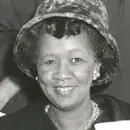
Dorothy Irene Height
Dorothy Irene Height was a prominent civil rights and women’s rights activist. As the longtime president of the National Council of Negro Women (NCNW), she focused on the issues of African American women, particularly unemployment, illiteracy, and voter awareness. She is credited as being the first civil rights leader to recognize that inequality for women and for African Americans is a closely related problem that should be addressed together.
Born in Richmond, Virginia, Height was educated at New York University (B.A., 1932; M.A. in educational psychology, 1933), and the New York School of Social Work (later Columbia University School of Social Work). In 1937, she began work as a counselor at the YWCA in New York’s Harlem Branch, where she created diverse programs and pushed the organization to integrate YWCA facilities nationwide. A chance encounter with Mary McLeod Bethune inspired Height to begin working with the NCNW, where she focused on ending the lynching of African Americans and restructuring the criminal justice system.
In 1957, she became the fourth president of the NCNW and served in that role until 1990. Under her leadership, the NCNW supported voter registration in the South and financially aided civil rights activists throughout the country. Eleanor Roosevelt, Dwight D. Eisenhower, and Lyndon B. Johnson sought Height’s counsel and political advice. In 1963, Height, along with other civil rights activists, organized the March on Washington for Jobs and Freedom. In 1974, she was named to the National Commission for the Protection of Human Subjects of Biomedical and Behavioral Research, which published The Belmont Report in response to the infamous Tuskegee Syphilis Study–and remains a defining moment in the regulation of human subject research.
In 1990, Height joined with other leading African American advocates to form the African American Women for Reproductive Freedom. She also served as the chairperson of the executive committee of the Leadership Conference on Civil Rights, an umbrella group of civil rights organizations. In recognition of her efforts in the civil rights movement, Height received the Citizens Medal Award in 1989 and the Congressional Gold Medal in 2004. She also received the Presidential Medal of Freedom in 1994.